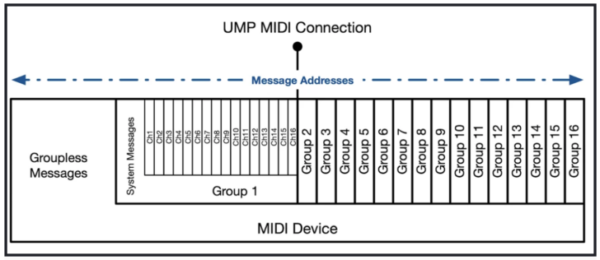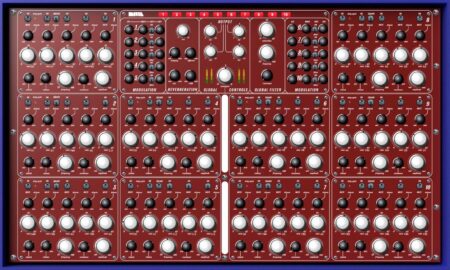Moog Music now part of inMusic family, Home to Akai Pro, Alesis, Denon, M-Audio, Numark, Stanton, Rane + Others

Moog Music joins Akai Pro, Alesis , M-Audio and Denon in the inMusic family in a bid to “overcome long-standing challenges and strengthen the company”
Moog Music has announced that it is now part of inMusic, the music technology super-company, home to a wide range of music industry brands, including Akai, Alesis, Denon, M-Audio, Numark, Stanton, Rane and others.
Moog says that the company will be keeping production and product development in its hometown of Asheville, North Carolina, but joining inMusic will give them access to inMusic’s more efficient supply chain and global distribution for Moog Instruments around the world. In addition, Moog Music’s deep expertise in analog synthesis will enhance the capabilities of inMusic and its exclusive brands
In a statement, Moog says that “this partnership with inMusic presents new opportunities to overcome long-standing challenges and strengthen the company.”
“The collaboration between Moog Music and inMusic will usher in an exciting new chapter of innovation, introducing a range of groundbreaking instruments for creatives worldwide,” adds Moog. “This partnership will expand Moog Music’s reach into new communities while continuing to push the boundaries of music technology. The shared values, mission, and legacy between the two companies make this alliance a remarkable opportunity for Moog Music and its dedicated community.”
Here is their official announcement:
To our friends, artists, partners, collaborators, and community:
It is my pleasure and privilege to bring you the exciting news that Moog Music has joined the inMusic family.
With its diverse roster of innovative companies across the music technology space, inMusic is known for its dedication to developing quality performance and production instruments for musicians across the globe. We are thrilled to join this group of talented, like-minded people who support our mission as we continue to design and build the world’s best-sounding electronic musical instruments.
Devoted to maintaining the sound, quality, and manufacturing philosophy that Moog is known for, inMusic is able to offer solutions to support the areas that have been ongoing challenges for our company as a small manufacturing business. This new partnership will enable us access to inMusic’s efficient global distribution and supply chain network while providing inMusic and its affiliated brands with deep expertise in analog synthesis.
With product development continuing to be led by Steve Dunnington, a long-time Moog engineer and former student of Bob Moog, we are proud to keep engineering, designing, and building instruments in our hometown of Asheville, North Carolina, USA.
Our new partners at inMusic, based in Cumberland, Rhode Island, will bring an extraordinary wealth of knowledge and experience to help bolster our efforts and build upon our 70-year legacy.
The recent conversations that I’ve had with inMusic CEO Jack O’Donnell have been inspiring, to say the least. Jack shared with me the stories of his first synthesizer, a Moog modular system, and the impact this instrument and Bob’s vision have had on his career. We had the opportunity to host Jack at the Moog factory recently and share with him the passion and dedication our small team brings to our work daily.
We are excited to introduce you to the many innovative hardware and software instruments our team has on the horizon. This partnership with inMusic will allow us to reach new communities and continue to push the boundaries of music technology. Finding a partner that honors our values, mission, and legacy is a great boon for our company and community.
The future is bright for Moog and the incredible community that has embraced our instruments and all we stand for. We’re grateful for your loyalty and support along the way, and we can’t wait for you to see (and hear) all that’s ahead.
Sincerely,
Joe Richardson
President, Moog Music
Moog has a long, complex history as a brand.
It was originally founded in 1953 in Trumansburg, NY by Robert Moog as the R.A. Moog Co. In this original incarnation, the company introduced some of its most iconic products, including the Moog Modular and the Minimoog.
In 1971, the brand was sold and moved to Williamsville, New York. Robert Moog left the company in 1977. The company declared bankruptcy in 1987. During this time frame, the company introduced several important instruments, including the Polymoog keyboard and the Taurus bass synth.
Robert Moog started a new company in 1978, Big Briar, to get back to his roots as a small manufacturer of theremins. There, he created products like the Ethervox and Etherwave theremins, and the Moogerfooger line of effects pedals.
Rights to the Moog Music brand returned to Robert Moog in 2002, and Big Briar was rebranded as Moog Music. Since then, the company has released a long string of important instruments, including the Minimoog Voyager, their line of Eurorack semi-modular instruments, the Grandmother & Matriarch keyboards, the Moog One polysynth, innovative software synths like Animoog and reissues of classic designs from the ’70s.
Moog Employees Getting Payout From Sale
In 2015, Moog announced an employee ownership plan, with employees owning 49% of the company. With the acquisition, inMusic is buying out the employees.
Moog spokesperson Jeff Touzeau told Gizmodo via email that “All past and present employees who have participated in the Moog Music Employee Stock Ownership Program (ESOP), since it was implemented in 2015, will receive a payout.” via Andreas Markusen





